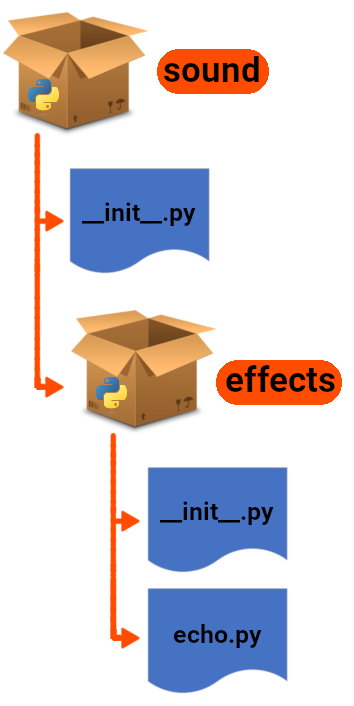Package
- A package is a group of python modules.
- A package can have many subpackages: a subpackage is just another package within a bigger package, helping us to organize our code.
-
Suppose you’re developing a package to process audio files:
- There are different audio files with different extensions.
- Each extension needs to be processed differently.
- You might find out tomorrow that there is this new extension which is gaining popularity.
- You wanna provide different functionalities, e.g.:
- Mixing.
- Adding echo.
- Applying an equalizer function.
- Creating an artificial stereo effect.
- Etc.
-
Possible structure for your package:

soundis the top-level package.__init__.py:- Initialize the sound package or other subpackages.
- It will be executed only once, in fact you’ve seen this behavior here. It is the same idea but now you know that when you import a package or subpackage it will executes the
__init__.pyonce. - Can just be an empty file.
- It is mandatory by Python.
- Mark a directory as a package/subpackage.
Using the Sound Package
Clients of this package then can import it like this:
import sound.effects.echo
Now to apply an echo effect we can say:
sound.effects.echo.apply_effect(input, output, delay=0.7, atten=4)
Or you can simplify it a little bit by importing the echo module to use it directly:
from sound.effects import echo
echo.apply_effect(input, output, delay=0.7, atten=4)
-
__all__:- A list of submodules inside a package/subpackage, e.g.
__all__ = [ "echo", # refers to sound/effects/echo.py # ... ] - Defined inside
__init__.py. - Will be used by Python when importing
from sound.effects import *.- Reminder: We do not use this anti-pattern though.
-
Note that if you have another object with the same name Python will pick that one. E.g.
__all__ = [ "echo", # !!! refers to the 'echo' function now !!! # ... ] def echo(msg: str): # <-- this name shadows the 'reverse.py' submodule return msg[::-1]Reminder, msg is using sequence slicing feature of Python.
- A list of submodules inside a package/subpackage, e.g.
Intra-package References
Suppose you need to import sound/effect/echo.py module inside the sound/filters/vocoder.py. We can do it either with:
-
Absolute imports:
# sound/filters/vocoder.py from sound.effects import echoUsed mainly by the main module.
-
Or relative imports:
# sound/filters/vocoder.py from ..effect import echoCan be used in subpackages. But inside a subpackage we can actually use either absolute imports or relative ones.